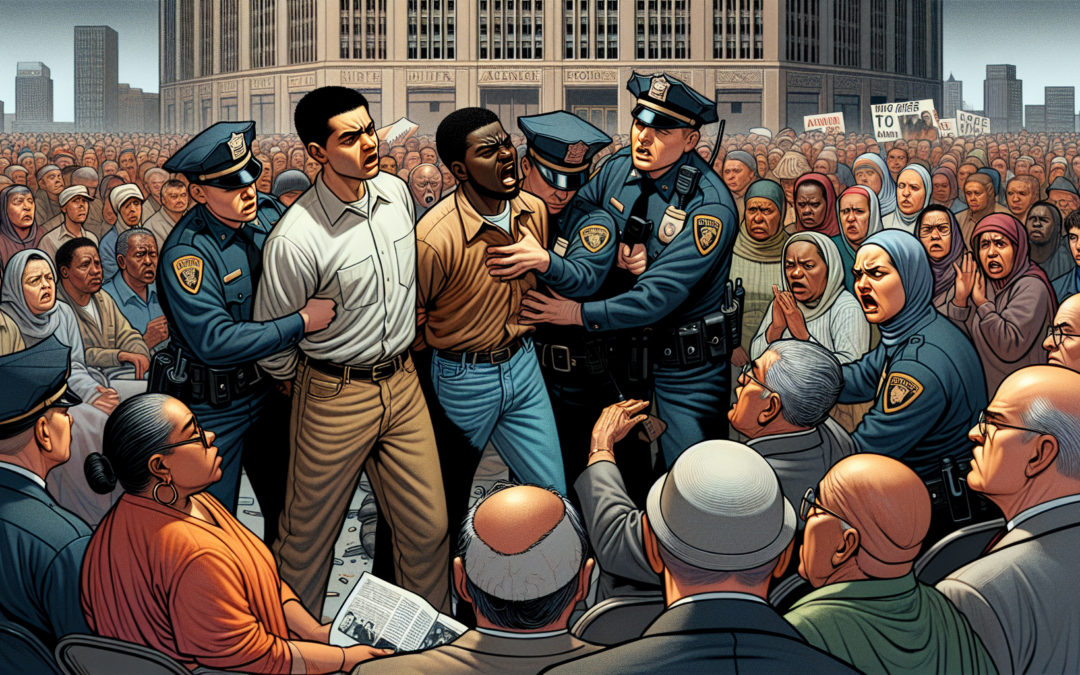Standing Up for Order: The Reality of Law Enforcement’s Role in Public Peace
The chaotic scene during the public government meeting serves as a vivid reminder of the realities that law enforcement officers face daily. As Billy’s voice echoed through the hall, disrupting proceedings, the officers were put in an unenviable position. Charged with maintaining the sanctity of the meeting and ensuring public order, their decision to arrest Billy was not one taken lightly but out of necessity. Behind the graduated steps of law enforcement action lies a commitment to communal peace that must be understood and appreciated.
The Role of Law Enforcement in Society
It is facile to decry the actions of law enforcement when viewed through a narrow lens. Law enforcement officers do not operate out of malevolent intent but follow established procedures designed to protect civilians and uphold the rule of law. In Billy’s case, the officers arrived upon a combustible situation where tensions were escalating. Continued disruption posed the risk of turning a diffident crowd into a volatile mob. At that crucial juncture, their intervention was akin to seizing control of a fraught environment before it could spiral into something far dire.
The Process of Enforcement
The decision to arrest an individual, especially in a public venue, is never arbitrary. Officers are trained to de-escalate situations using the least confrontational methods available. Persuasion, warnings, and non-violent means are the first steps. Billy, however, was resolute in his defiance even as repeated calls for order went unheeded. At what point should the sanctity of a public meeting be restored if not through measured intervention by the uniformed officials entrusted with such responsibilities? The arrest of Billy, therefore, was emblematic of law enforcement doing its job—upholding respect for rules that enable the free democratic process to flourish.
Balancing Rights and Responsibilities
Civil liberties are at the heart of our democratic fabric, but it falls upon law enforcement to ensure these rights are exercised within the boundaries of public decorum. When Billy chose to breach these boundaries, the officers had two choices: stand by idly and allow chaos to reign or step in and restore order. Their decision to arrest him underscored the premise that while free speech is pivotal, it must be harmonized with societal responsibilities. Officers walk this tightrope every day, sometimes at the expense of quick public judgment and widespread misconstruing of their roles.
The Public Perception of Law Enforcement
There is no denying the contemporary challenges facing law enforcement agencies. With cellphone cameras capturing every move and social media magnifying each action, public perception is quickly shaped. The footage of Billy’s arrest, for instance, can easily be framed to incite outrage against law enforcement. Context is often the first casualty. In the labyrinth of opinions and virulent rhetoric, the nuance of duty and situational compulsions gets lost. Visit The John Ligato Show YouTube Channel and watch The Arrest of Billy to understand the officers’ predicament better.
The Emotional Toll on Officers
Criticisms and hasty judgments aside, it’s crucial to acknowledge the tremendous psychological toll on officers who must take these difficult decisions. The job demands a balance of judgement and bravery—knowing that each action can be under intense scrutiny. A sense of duty compels them, even as they confront vilification. Social repudiation can be a heavy burden, added to the inherent risks they face on the line of duty. Yet many officers rise to this challenge every day, fortified by a commitment to their communities. Their very presence at such volatile moments is not something to bemoan but to recognize as one of service to the collective good.
Looking Forward
Law enforcement is an evolving field, grappling with the nuances of an increasingly vociferous public and complex societal dynamics. Training, policy clarity, and accountability are crucial to narrowing the gap between intention and perception. It is also imperative for the public to engage in supportive dialogue, acknowledging that enforcing laws is an inherently arduous task. Dialogues like those on The John Ligato Show provide insight into these nuanced realities.
In this episode of The John Ligato Show, we confront the uncomfortable truth about Billy’s arrest at the public government meeting. Underneath the knee-jerk outrage lies a broader conversation about the responsibilities carried by law enforcement and the societal imperative to maintain order respectfully. Our officers operate not in a vacuum but within the frameworks we have entrusted them to uphold. Hence, it is our collective duty to imbue this recognition with empathy and discernment, striving for a balance where freedom and order coexist meaningfully.
By imparting a deeper understanding of events like these and fostering an environment of intentional discussion, we honor those who shield us against societal disarray even as they mirror our desire for a just and orderly society.

Recent Comments